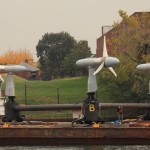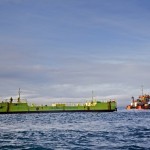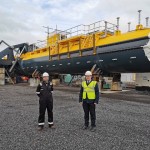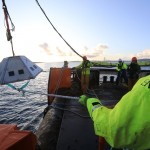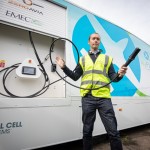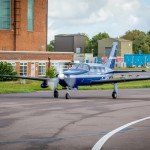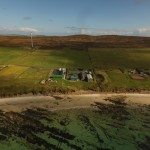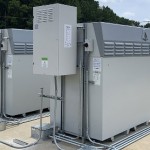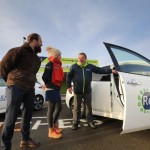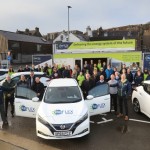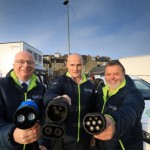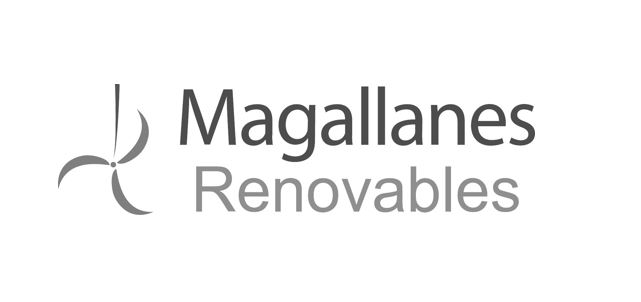Blog: EMEC in review 2020
2020 has been a challenging, strange year for all. At EMEC, like across the world, we have learnt to adapt and build up resilience to new challenges, first and foremost, keeping our staff, partners and community safe.
Despite well-known difficulties faced this year, we are very inspired by the successes that we, and the renewables industry in general, have achieved. An assessment of our economic impact by BiGGAR Economics estimates that, between 2003 and 2019, EMEC has generated a total £306 million gross value added to the UK and 4,517 FTE job years, of which 1,824 FTE job years were created in Orkney. Over 50% of all EMEC spend is spent locally in Orkney further demonstrating positive local impact. Our values drive the work we do and we are encouraged by the tangible impact we have locally and nationally.
We have seen fantastic advances in the marine renewables industry, both technical and governmental. Exciting milestones include the signing of a ground-breaking partnership with the Perpetuus Tidal Energy Centre (PTEC) in the Isle of Wight, the near completion of Orbital Marine Power’s O2 build due to be tested at EMEC in 2021 and achieving great strides forward in the campaign for revenue support for wave and tidal energy. Despite restricted travel, this has been an important year for EMEC internationally, strengthening our alliances worldwide whilst sharing our knowledge and expertise to further the development of ocean renewable industries across the globe.
Following our recent years’ work on smart energy systems, we are thrilled with the public launch of ReFLEX Orkney which has the potential to transform Orkney’s energy system, and once demonstrated here, other communities nationally and internationally. Moreover, we have continued to build on our experience in the green hydrogen sector marked by the world’s first hydrogen-electric flight of a commercial-sized aircraft.
We are extremely proud that Orkney has been awarded €100,000 in the first ever EU RESPonsible Island Prize, internationally recognising the community’s drive towards innovative, low-carbon living. Furthermore, Orkney welcomed UK Prime Minister Boris Johnson in July 2020, coinciding with the Islands Growth Deal announcement to provide £100 million towards green recovery and net zero ambitions of Scottish islands. It marks a turning point for our Islands and for our work at EMEC, now working towards net-zero commitments by 2030.
Ocean energy
This year EMEC was appointed as the world’s first ocean energy Renewable Energy Testing Laboratory (RETL), the highest international designation for marine energy test laboratories, awarded to us in August by the International Electrotechnical Commission – Renewable Energy System (IECRE). The first technology to be assessed by EMEC as a RETL will be Verdant Power who are working to receive the first Renewable Energy Test Report (RETR) through the IECRE system. We initiated a power performance assessment for Verdant Power in December, remotely witnessing the start-up of the Triframe Gen5 turbines in New York City’s East River.
Working with the UK’s Marine Energy Council, we have continued our lobbying efforts with fruitful results. It’s great to see that collaborative industry efforts are resulting in steps forward. Highlights include securing UK Government commitment to marine renewables in the Contracts for Difference (CfD) Allocation Round 4 and the UK Environmental Audit Committee’s Call for Evidence on tidal energy. We will continue to mobilise efforts on this front.
The EMEC-led OceanDEMO and BlueGIFT projects, as well as MaRINET2, have continued to award opportunities for testing technologies in the sea at EMEC and other European test sites. OceanDEMO’s third call added 11 technology developers to the project pipeline (including Aqua Power, Inyanga Maritime, Leask Marine, Mocean Energy and Tidetec AS for testing at EMEC) and Blue-GIFT’s second call recommended five companies for support to deploy in the Atlantic Area region. Although 2020 has been a challenging year for demonstration projects OceanDEMO has deployments planned for early 2021 and we look forward to sharing these with you in the New Year.
Through the Marine Energy Alliance (MEA) project, EMEC has been working with 16 early-stage technology developers to de-risk development prior to demonstration at sea. Throughout 2020 we delivered a range of services aimed at aligning early stage testing with international standards and providing technical assessments. This includes a 17020 accredited inspection of SeaWave Energy’s tank tests at Ecole Centrales de Nantes, a regulatory feasibility study for Inyanga, technology assessment for Centipod, and providing input to collaborative feasibility studies and techno-economic reviews of emerging technologies, drawing on our experience in hydrogen to feed into the work of developers such as Dolfines, Lhyfe Labs and Farwind. EMEC is also offering its services through the Ocean Energy Scale Up Alliance (OESA) . We’ve enjoyed working with Floating Power Plant to align their test campaign with IECRE standards and are supporting Seabased to prepare for certification.
Tidal energy
Magallanes Renovables’ completed the Ocean_2G project and will continue to test its second generation 2 MW tidal platform ‘ATIR’ through MaRINET2 and OceanDEMO. Having had the ATIR off-site for maintenance, we’re looking forward to welcoming them back to the EMEC site in early 2021.
We continue to work with Orbital Marine Power through FloTEC, ITEG, TIGER and OceanDEMO, with the O2 turbine build nearing completion and due to be installed at the Fall of Warness early next year. Orbital’s prototype 2 MW SR2000 tidal turbine was decommissioned following a hugely successful test programme which saw over 3,250 MWh of electricity generated at EMEC. Orbital has also recently launched a crowdfunding campaign smashing its £1 million target within a couple of weeks, with over 1000 investors signed up so far, and has signed up to a second EMEC tidal berth with the aim of delivering its first floating tidal turbine farm by 2022.
We continue to work in collaboration with 18 partners across the UK and France to deliver the Tidal Stream Industry Energiser (TIGER) project, the biggest ever Interreg project (€45.4m). The project aims to drive growth of tidal stream energy in France and the UK with significant economic benefits for coastal communities. EMEC is leading on communications for the project, as well as supporting site development activities such as resource assessment, acoustic analysis and consenting support, and providing performance assessment. Check out the six supply chain webinars that we helped host throughout the year.
Our 2020 tidal chapter culminates in the recently signed EMEC-PTEC partnership. Following positive market signals from the UK Government, we joined forces with PTEC to develop a large-scale tidal energy site off the Isle of Wight, England. EMEC is helping to prepare the site, ensuring it is eligible for tidal technologies to bid into future UK CfD allocation rounds.
Wave energy
On the wave-front, we are working closely with AWS and Mocean who are gearing up to test with us next year through the Wave Energy Scotland programme. Additionally, Wave Energy Scotland awarded £1.4 million this summer to four projects developing quick connection systems to improve the installation efficiency and infrastructure of wave power devices. EMEC is partnered with two of the successful projects, led by Quoceant and Apollo respectively.
We have partnered with Seabased Group via the OESA project to design and implement a testing and certification programme to drive quality-controlled manufacture, reducing costs of their wave power park technology.
2020 also saw the closure of the WaveBoost Horizon2020 project having significantly improved CorPower’s wave energy converter (WECs) reliability and performance. Led by CorPower Ocean, the WaveBoost consortium designed and developed an advanced power take off (PTO) system, allowing WECs to operate safely and more reliably in harsh ocean conditions, while increasing annual electricity production by 27%.
Find out more about the science behind harnessing energy from the sea in the ‘Power from coasts and waters’ session that we hosted as part of the Orkney International Science Festival:
Floating wind
This year has seen the early stages and development of the AFLOWT project. Based in Ireland, EMEC is leading the project which is working towards a full-scale floating wind turbine being deployed off the west coast of Ireland at the Atlantic Marine Energy Test Site (AMETS) test site near Belmullet, Co. Mayo. Despite some delay in the project due to the challenging circumstances encountered this year, all partners have continued to work closely, and we look forward to exciting project advances to come in the New Year.
Green hydrogen
2020 has marked a milestone in the development of the green hydrogen industry. At EMEC, we are proud to be core partners in projects that are demonstrating the applicability of hydrogen in the decarbonisation of our energy system.
Through the HyFlyer project, we witnessed the world’s first hydrogen fuel cell-powered flight involving a commercial-sized aircraft. Emitting only water vapour, this was a huge success for both the hydrogen and aviation industries demonstrating the potential for regional flight decarbonisation. Led by ZeroAvia, EMEC have supported the test flight programme through hydrogen provision and delivery of an end-to-end hydrogen refuelling solution. Designed to support multiple daily flights, the mobile refuelling solution consists of a re-deployable modular electrolyser, trailer mounted air compressor and a first of its kind ADR-certified 350 bar refuelling truck. Building on this, we’ve strengthened our partnership with ZeroAvia through the launch of the HyFlyer II project, through which we will supply green hydrogen for the 19-seat hydrogen-electric aircraft development programme, helping to make zero-emission flights a commercial reality.
In another world-first, we also announced a new project to combine tidal power with Invinity Energy Systems’ flow battery technology. The combination of tidal energy and flow battery technology will enable continuous production of green hydrogen and will power our hydrogen production plant on Eday following installation next year, improving efficiency and introducing further resilience to our energy system.
In partnership with Ricardo, we supported the delivery of a new solar-powered hydrogen production facility on the Isle of Wight by assessing the safety and regulatory aspects of the project.
At a policy level, the UK Government has announced support for hydrogen-based projects, and will be launching a Hydrogen Strategy in 2021, to which we have contributed by sharing our expertise and learnings in this area. Moreover, the Scottish Government’s Hydrogen Policy Statement has been published. We also signed a letter in support of the EU Commission’s Clean Hydrogen Alliance alongside 90+ other Hydrogen Europe members to promote hydrogen as an enabler of the post-COVID economy and a zero-emission society. Despite uncertainty surrounding the UK’s EU exit in the coming months, we are determined to uphold and nurture our relationship with our European partners in 2021 and beyond.
Find out more about the latest hydrogen projects – from generating hydrogen from tidal energy, decarbonising lifeline island services (ferries and aviation) and key industries (distilling), and integrating the energy system across Orkney’s islands in the ‘Orkney energy revolution’ session that we hosted as part of the Orkney International Science Festival:
Smart energy systems
Having passed the first UKRI stage gate earlier in the year, the ReFLEX Orkney project partners have worked tirelessly to launch a new local energy company – ReFLEX Orkney Ltd – and a range of new low-carbon transport and power services exclusive to Orkney residents and businesses. This was a major milestone for the project to help further decarbonise the island’s energy system and as lead partner we’re delighted to see concept turn into reality. Once proven in Orkney, the model can be used to pave the way for other regions in the UK to adopt a localised integrated energy systems approach.
On a slightly bittersweet note, this year has also seen the completion of Project Natick with Microsoft retrieving its subsea data centre from our Billia Croo test site where it had been testing since 2018. After two years of data compilation and reporting, Microsoft shared its findings on energy, efficiency, waste and water obtained through the project. We look forward to seeing what Microsoft’s next steps in this arena will be.
In the context of data-sharing, a success for the industry in 2020 has also been the launch of Marendata, an open-access data platform launched to disseminate environmental monitoring data collected within the marine energy industry, to which we contributed with data gained from our years of experience in this arena.
International ties
We expanded our ties across the UK supporting Marine Energy Wales to set up the Marine Energy Test Area (META) in Pembrokeshire, Wales. EMEC supported META by conducting a facility review including a gap analysis, development of standard operating procedures (SOPs) for the safe and efficient operation of META, as well as assisting with client management.
Renowned for our marine energy expertise, we fed into the 2019 Project Peer Review Report released by the U.S. Department of Energy, with our Technical Manager Elaine Buck chairing the MHK Peer Review Programme and leading the technical review. We also supported the Pathway Program, working with Offshore Energy Research Association (OERA) and the Fundy Ocean Research Centre for Energy (FORCE) to deliver a new report incorporating international expertise on passive acoustic monitoring (PAM) in high tidal flow environments.
We have also been working with the Korea Institute of Ocean Science and Technology (KIOST) to support the development of its tidal energy test site at Jang-Juk Strait near Jindo Island, Korea.
Moreover, POM West Flanders reached out to EMEC for help in the development of their ‘Blue Accelerator’ test platform into an international hub for blue growth. EMEC will contribute by providing advice on business development, commercial strategy, operational guidance and financial tools to help bring the Blue Accelerator to market.
Our international network continues to work together on identifying challenges and opportunities, despite the strange and unexpected circumstances brought by 2020. Unfortunately, we were unable to host our International WaTERS (Wave and Tidal Energy Research Sites) meeting this year due to Covid-19, but are planning a virtual event to be held in early 2021 to continue test-centre collaboration and knowledge sharing.
Movers and shakers
2020 has also been an exciting year at EMEC with around 20 new people coming into the organisation.
Caroline Butterfield joined the Non-Executive Directors and EMEC board in early January 2020.
In the operations and technology team, we welcomed three new Performance Test Engineers, Yann Corlay, Craig Dibb, and Cristina Lozano Martinez. Paul Tait joined the Environment and Consenting team (read Paul’s blog on starting a new job during a pandemic here) while Donald Leaver stepped up into the position of Senior Environment and Consents Officer.
Rhoy Philby joined us as Hydrogen Engineer and Baptiste Mathie-Claverie joined in the role of Engineering Technician.
James Ferguson, who is in the final stages of his thesis through the IDCORE programme, has taken on a new position as R&D Engineer. Congratulations to James on his incredible achievements this year, having been awarded the Scottish Renewables YPGEA Academic Award and the Young and Inspiring Award at the Green Energy Awards.
Alyona Naberezhnykh and Luke Evans joined us through the IDCORE programme this year as Research Engineers looking at metocean analysis for tidal energy devices, and Ana Couto joined us under the MASTS programme to study the distribution and behaviour of marine animals in tidal stream areas.
Our Commercial Team has seen an exciting reshuffle this year with Matthew Finn appointed as Commercial Director and Rob Flynn took on the Commercial Manager role left vacant by Matthew. We’ve welcome two new business Development Managers: Dernis Mediavilla has taken on the role of Marine Energy Development Manager and James Walker, Hydrogen Development Manager. Catrin Sutherland has taken on the role of Senior Commercial Officer to focus on EMEC’s commercial delivery, and Lara Santos Ayllon has joined us in our graduate Stakeholder Engagement Officer position.
Richy Ainsworth moved across the pond to the US taking on a new role of US Project Engineer.
The projects team has welcomed two new Project Managers, Nithiananthan Vejayan and Adele Lidderdale, with another addition, Matthew Storey, due to join the team in January 2021. Ingrid Ritch took on the Project Administration Officer role.
EMEC has also taken on a number of Associates this year, including Kris Hyde, Andrew Hunt, Winston D’Souza and Marcel Van Mellaerts.
Leavers
2020 also saw EMEC say goodbye to some members of staff, including our previous Commercial Director, Oliver Wragg, who has taken on a new role with Orbital Marine Power. Farewell also goes to Jon Clipsham, who has stayed in the hydrogen space and Saul Young who has joined the META team in Wales. Trish Casey left the company following the end of her maternity cover role. We wish them all the best and are happy to know our paths will continue to cross.
Sadly, we also lost one of our own, Gary Clanachan, in March of this year. Gary is sorely missed, and our condolences and respects are with his family always.
Some final thoughts from Neil
As ever this end of year report makes breath-taking reading. The range of activities in which EMEC is involved has continued to expand and is a source of both pride and gratitude: pride because we see that the work EMEC is doing is of value to the industry and project funders, and that the vision which set up EMEC to help drive innovation and economic activity is demonstrably working. Gratitude is given that so many smart, motivated and intelligent people are willing to join together to help drive decarbonisation as a group. We never take any of this for granted and we strive to keep being relevant during whatever changes come along.
2021 is going to be a challenge; we must accelerate our efforts to decarbonise whilst at the same time we need to reshape and restart the economy. We will have to do this from outside the EU and during a period when we expect to see enormous economic challenges.
However, despite these significant challenges, we find ourselves in the unparalleled position of seeing increasing public and business interest and support for all of the areas in which we are involved.
So, we have the people, we have many of the skills, we have the technology working, we have the political support building.
We have the mission; it is now down to us to deliver.
To close: I need to say a sincere thank you to everybody who interacted with EMEC in 2020. What we have achieved is only possible because of our customers, supporters and the people around us. We are fiercely proud to be based in such a supportive community and we wish everybody all the best for 2021.

